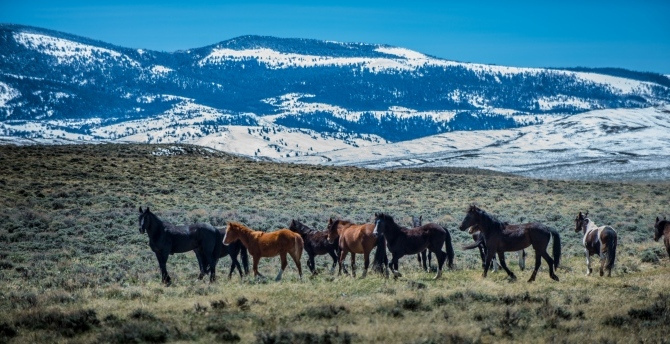
While some governments worry about repopulating near extinct animal species, the United States Bureau of Land Management (BLM) is currently tasked with managing the overpopulation of wild horses and burros on public land. BLM has struggled to control the population in a cost-efficient manner, so the Montana-based Property and Environment Research Center (PERC) has put forth solutions to incentive private adoptions and save taxpayer money.
PERC’s proposed program incentivizes qualified homes to adopt these wild horses by providing $1,000 to help cover expenses associated with training and caring for the horses and burros, and BLM has recently implemented such a program. Beforehand, horses were being placed in short-term off range facilities, costing up to $48,000 over each animal’s lifetime. This new program will not only save taxpayers millions of dollars, but more horses will enjoy permanent homes with loving families as opposed to being housed in massive, short-term facilities. People adopting these wild horses and burros will be paid $500 within 60 days of adoption and another $500 per adopted animal a year later pending review of proper care and official title transfer.
"Adoption is clearly a better outcome for a wild horse than starving on the range or living out the rest of its days in an overcrowded corral," writes Hannah Downey and Tate Watkins, of PERC. "For taxpayers, the per-horse savings is undeniable. Spending $1,000 to find a mustang a good home is orders of magnitude cheaper—and likely much more humane—than caring for it in a government holding facility for the rest of its life."
Over 82,000 wild horses and burros currently inhabit the 31.6 million acres of designated rangeland, which is over three times what the land can sustain. As a result, BLM removes thousands of horses and burros from the wild and places them in off-range holding pens and corrals. BLM spends nearly $50 million a year caring for such horses in its captivity.
BLM removed 11,472 animals from the wild in 2018, but only a small number of these horses were adopted. The new incentive program seeks to remedy that fact by encouraging private citizens to adopt these animals.
"The plan has the potential to help improve the lives of wild horses while also benefiting taxpayers," continue Downey and Watkins. "Owning and caring for a horse is not cheap. The $1,000 payment should promote adoptions as the stipend can help cover veterinary and training costs. This sort of approach has been widely used by animal shelters that offer free adoptions or waivers for veterinary care to help get pets placed in loving homes, and it has potential to make a real difference in the lives of wild horses and burros.
A recent Facebook post by the Wild Horse and Burro program claims that the adoption program would not only help to curb overpopulation, but would also save the taxpayers a significant amount of money. Rather than spending the money managing the herds in the wild, the $50 million that the program currently costs could be spent elsewhere.
Updated on January 10, 2020: Since the implementation of the adoption incentive program, adoptions have increased 62 percent.